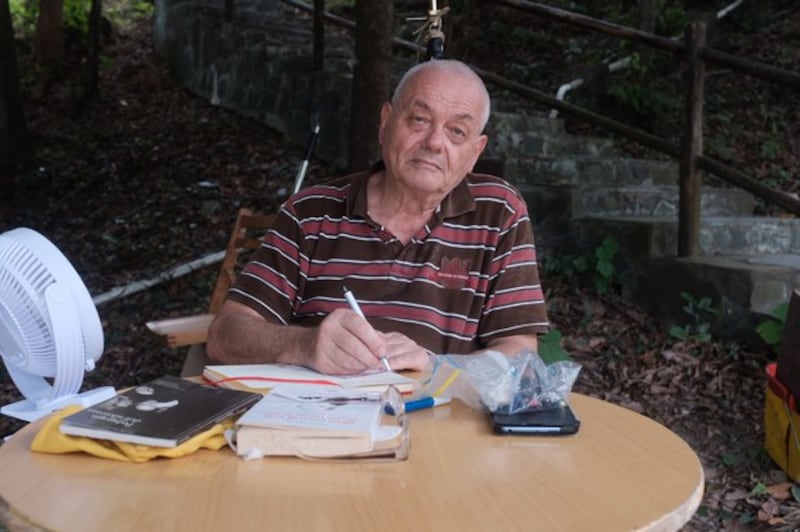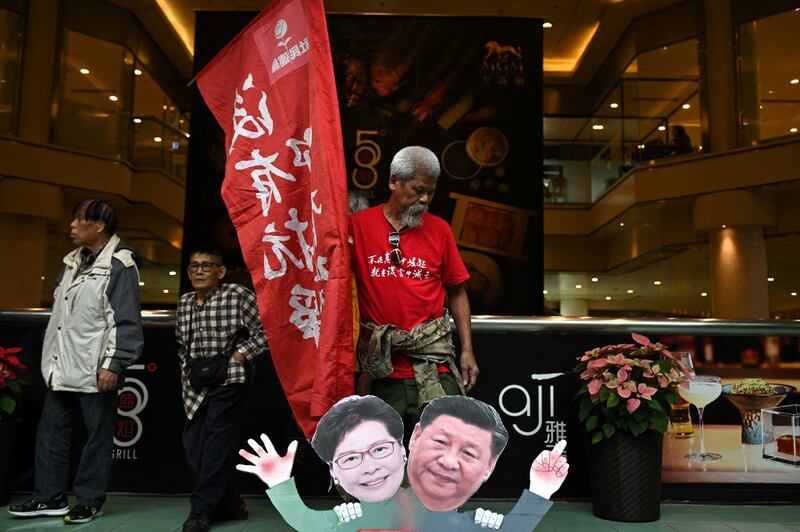A Catholic priest on Thursday began a three-day protest outside a maximum security jail in Hong Kong, refusing food and calling for the release of political prisoners, as two icons of former protests in Hong Kong were sentenced to jail and a top human rights barrister defended herself against spying allegations in court.
Italian missionary-turned-rights activist Franco Mella, 74, began his protest amid warnings of extreme heat from the government, standing on a dam on Lantau Island overlooking Shek Pik Prison.
He called on the authorities to release political prisoners.
"They have stood up for workers and the poor for decades. What kind of law can convict them? Are those laws right?" Mella told RFA. "This hunger striker hopes to share a little of their pain, because the weather is so hot, and they must be suffering."
"They may also feel lonely in prison. They don't know if the community still remembers them. I hope to show them that we still care about them very much," he said.
Mella said he plans to fast for six days for all prisoners of conscience in Hong Kong, regardless of faith or background.
"The government won't get a healthy society by constantly arresting and jailing people," he said. "Instead, they should acknowledge the rights of others and allow the opposition to speak out."
"Silence doesn't mean the problem has been solved."

'Foreign agent'
His protest came as former Tiananmen massacre vigil organizer and rights lawyer Chow Hang-tung defended herself and the now-disbanded Hong Kong Alliance against allegations of being "a foreign agent" under a draconian security law imposed by Beijing in the wake of the 2019 protest movement.
Chow took issue with the prosecution's "proof" that she and the Alliance were foreign agents, and argued that a specific definition should enter case law to prevent ever-expanding use of the term to encompass anyone with an overseas connection, according to independent journalist Suzanne Sataline, who live-tweeted Chow's self-defense on Thursday.
"The law must be challenged, otherwise there is no rule of law to control the govt’s power, the very essence of rule of law," Sataline summarized Chow as saying.
"The prosecution‘s argument would mean that any entity that is not a foreign agent could get served with an unlawful notice and nevertheless be convicted of noncompliance," Sataline wrote.
"Underlying unspoken assumption is that national security is always right and you cannot challenge that. Where does that play in the rule of law, the very essence which is abt restraining power, giving people the assurance that their lives would not be arbitrarily interfered with?"
Chow told the court that there could be hundreds or thousands of people in Hong Kong employed by different foreign governments all of whom will fit the law's description of an agent, without any of them being suspected of committing any offense, according to Sataline's account.
Chow's self-defense came a day after a magistrate's court jailed Alexandra Wong, 66, for "illegal assembly" for her role in the 2019 protest movement, where she was frequently spotted waving a British flag.
Nearly 3,000 people have been prosecuted under "illegal assembly" laws in connection with the protests, which began as a mass movement against extradition to mainland China, and broadened to include demands for fully democratic elections and greater official accountability.

'An authoritarian regime'
Wong pleaded guilty, but hit out at the Hong Kong government from the dock as "an authoritarian regime." She received an eight-month prison sentence for the "scale" of her contribution to public disturbances.
On Tuesday, a court convicted 75-year-old activist Koo Sze-yiu, who has terminal bowel cancer, of "attempting incitement" of hatred or dissatisfaction of the government under the national security law .
Koo was found guilty of planning to carry a coffin bearing the words "end the one-party dictatorship!" and "Down with the CCP!" on a protest organized by the League of Social Democrats outside the ruling Chinese Communist Party (CCP)'s representative office in Hong Kong in February, on the opening day of the Beijing 2022 Winter Olympics.
He was sentenced to nine months' imprisonment.
Koo told the court he had no problem "being a martyr" for the pro-democracy movement, and that what he would suffer was negligible compared with the huge numbers of political prisoners, journalists and rights lawyers jailed in mainland China.
Former opposition lawmaker Avery Ng said this means police will now be able to target any activist, whether they do anything or not.
"Koo hadn't even done anything yet, but was arrested for intending to demonstrate," Ng told RFA. "It's so easy for the police to arrest people they don't like or don't want to be visible."
"It's a further blow to freedom of speech and association," he said. "This is basically the criminalization of speech."
Translated and edited by Luisetta Mudie.
